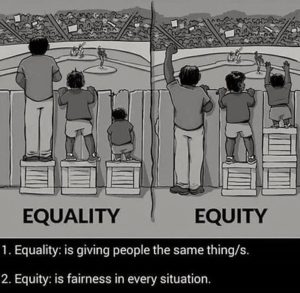It’s a new year and a new decade. So, philanthropic funders, what will our New Year’s resolutions be? Here are three suggestions:
1. Aim for Equity:
Is our funding reaching the causes and people who need it most? Or do we give to  organisations which are already well funded, and which serve communities that are already doing just fine?
organisations which are already well funded, and which serve communities that are already doing just fine?
According to a pre-release presentation of a JB Were Philanthropic Services report on funding in the NZ charitable sector: “91% of organisations fight over just 9% of donations.” In other words, most philanthropic funding in Aotearoa New Zealand goes to the biggest charities. (Curious about who those big charities are? According to my foray into the advanced search function of the NZ Charities Services register, Auckland University had 3.5b in total assets on their last return, almost 1.5b more than the charity with the second highest total assets, which was Otago University. That said, if we add together the assets of the various entities under the umbrella of mainstream religions, for example the Catholic Church, these charities are bigger still.)
Don’t get me wrong, giving to any worthy cause is a good thing to do. But thoughtful giving, which builds equity and reaches those who need it most, is, in my opinion, better still.
Suggested New Year’s Resolution 1: Review funding priorities and criteria using an equity lens to ensure that funding goes where it is most needed.
2. Keep it simple: 
In my experience, funding organisations often make slow decisions based on overly complex criteria and processes. I’ve blogged before about funding burden, which is the time and costs we impose on the organisations who request funds from us. And here is an interesting article from the UK, indicating that “46% of grants cost more than they are worth.” This conclusion was reached by estimating the average total cost of the time spent by funders, successful applicants and unsuccessful applicants applying for and assessing grants. This came to a scary £6,600 per grant – which happens to be a higher amount than 46% of grants made in 2018 in the UK…
Thankfully, it is perfectly possible to have robust decision-making without onerous processes. A good first step is to have an honest conversation with the decision-makers at your organisation about what information in either the grant application or the grant assessment is rarely used. Then simply delete these questions, and instead work on a case by case basis to get additional information if and when required. It is also useful to have an “Other Relevant Information” heading in both your application form and your grant assessment report, where specific considerations can be highlighted.
Suggested New Year’s Resolution 2: Review funding processes and simplify the information asked for.
3. Respect and appreciate the organisations we fund:
Funders usually receive both respect and appreciation from the organis ations we fund. This comes in many forms, including deferential funding applications, heartfelt gratitude and acknowledgment for funding received, gracious acceptance of funding declined, and diligent accountability reports.
ations we fund. This comes in many forms, including deferential funding applications, heartfelt gratitude and acknowledgment for funding received, gracious acceptance of funding declined, and diligent accountability reports.
But how often is this respect and appreciation fully reciprocated? Probably not very often. Objectively, this is a bit strange. Which is harder – to work, say, with a teenager battling addiction and depression? Or to assess a grant application and set up a bank transfer? And who’s doing the more important work here?
Becoming more respectful and appreciative of the organisations we fund is not hard, and can be done at little or no cost. We can express gratitude for both the application and the opportunity to contribute to their work, we can be respectful of our applicants’ time by keeping our requirements simple as described above, and we can take a genuine and supportive interest in the ups and downs of their work. Being more respectful and appreciative also means not trying to take the credit for the work of the organisations we fund, not trying to micro-manage things, and, above all, not assuming that we know best.
Suggested New Year’s Resolution 3: Build a stronger culture of respect and appreciation.
Happy resolution making, and may 2020 be the best year yet for philanthropy, for the organisations we fund, and for the communities we all serve.